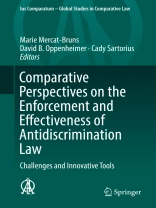This book focuses on anti-discrimination law in order to identify commonalities and best practices across nations. Almost every nation in the world embraces the principle of equality and non-discrimination, in theory if not in practice. As the authors’ expert contributions establish, the sources of the principle vary considerably, from international treaties to religious law, traditions and more. There are many approaches to methods of enforcement and other variables, but the principle is nearly universal. What does a comparison of the laws and approaches across different lands reveal?
Readers may explore the enforcement and effectiveness of anti-discrimination law from 25 nations, across six continents. Esteemed authors examine national, regional and international systems looking for common and best practices, identifying innovative approaches to long-standing problems. The many ways that anti-discrimination law is enforced are brought to light, from criminal or civil prosecution through to community resolution processes, amongst others. Through comparing the approaches of different lands, the authors consider which methods of enforcement are effective.
These enriching national and international perspectives highlight the need for more creative, concrete and coordinated means of enforcement to ensure the effectiveness of anti-discrimination law, regardless of the legal tradition concerned, but in light of these traditions. Readers will find each nation remarkable, and learn something new and interesting from each report.
Inhoudsopgave
Introduction/General Report; Marie Mercat-Bruns and David B. Oppenheimer.- National Reports.- Argentina (E); Ursula Basset, Alejandra Rodriguez Galan, and Alfredo Vitolo.- Australia (E); Dominique Allen and Beth Gaze.- Belgium (E); Emmanuelle Bribosia and Isabelle Rorive.- Brazil (F); Elton Venturi.-Canada (E); Colleen Sheppard.- Canada (F); Stephane Beaulac.- Croatia (E); Dijana Kesonja and Emilia Miscenic.- Czech Republic (E); Marketa Selucka.- Denmark (E); Pia Justesen.- France (F); Sophie Latraverse.- Germany (E); Malte Kramme.- Greece (E); Antonia Papadelli.- India (E); Maithili Pai and Nupur Raut.- Israel (E); Tamar Kricheli Katz.- Italy (E); Marzia Barbera and Alberto Guariso.- Japan (E); Akiko Ejima.- Korea (E); Jean Ahn.- Lebanon (F); Maan Bou Saber.- Portugal (E); Anna Maria Guerra Martins.- Romania (E); Irina Moroianu Zlatescu.- South Africa (E); Debbie Collier.- Spain (E); Maria Jose Gomez-Millan.- Turkey (E); Nurhan Sural.- United Kingdom (E); Colm O’Cinneide.- United States (E); Fred Morrison and Julie Suk.- Regional Reports.- European Court of Human Rights (E); Mathias Moschel.- Inter-American Court of Human Rights (E); Anne-Claire Gayet.- International Criminal Court (F); Dominique Viriot.- Appendix I: The Questionnaire.- Appendix II: Biographies of the Authors.
Over de auteur
Marie Mercat-Bruns is an Affiliated Professor at Sciences Po Law School and a tenured Associate Law Professor at the Conservatoire National des Arts et Métiers where she copilots the Gender Program (LISE, CNRS). Member of the scientific board of Presage (Sciences Po Gender program), she also heads a community based public interest law clinic at Sciences Po focused on discrimination with the French Defender of Rights. She finished in June 2016 a two year study for the French Ministry of Justice and the Defender of Rights on discrimination law in France and the Netherlands, with the collaboration of the University of Paris-Assas CERSA (CNRS) and the Research Institute CEVIPOF-Sciences Po. Her most recent books include Discrimination at Work: Comparing European, French, and American Law. Oakland: University of California Press, 2016. Discriminations en droit du travail : dialogue avec la doctrine américaine Dalloz 2013 583 p
David B. Oppenheimer is a clinical professor oflaw at Berkeley Law, where he co-directs the Berkeley Law Pro Bono Program, directs the Berkeley Comparative Equality and Anti-Discrimination Law Study Group, and writes and teaches about comparative equality. He is a co-author of the leading US casebook on comparative equality law.
Cady Sartorius is an attorney at the California Civil Rights Law Group—a plaintiff-side firm focused on fighting harassment and discrimination in the workplace. Before studying law, Cady had a career as a sign language interpreter and did extensive volunteer work for individuals with disabilities, which led to her interest in civil rights law.












